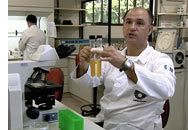Documentary about biofuels: "The Brazilian Revolution"
 Tonight, Europe's leading cultural television channel and production house, ARTE, airs a documentary on biofuels in Brazil (presentation of the film in French and in German). The work titled "Biocarburants: la révolution brésilienne"/"Sprit aus Zucker!", made by Pierre-Olivier François en Christian Popp, asks whether the Brazilian example is to be followed by other countries.
Tonight, Europe's leading cultural television channel and production house, ARTE, airs a documentary on biofuels in Brazil (presentation of the film in French and in German). The work titled "Biocarburants: la révolution brésilienne"/"Sprit aus Zucker!", made by Pierre-Olivier François en Christian Popp, asks whether the Brazilian example is to be followed by other countries.The industrial-scale, technology and science-driven ethanol sector in Brazil is over 30 years old. Currently, more than 70% of all cars in the country use the fuel which is made primarily from sugarcane. The biofuel is both cheaper and considerably less polluting than gasoline. Moreover, contrary to its fossil counterpart, it is renewable and the expansion of its production can be planned.
The documentary follows José, a small sugarcane farmer in São Paulo state who has been growing the crop all his life to make sugar from it. Thirty years ago, he started supplying one of Brazil's first ethanol plants.
In Brazil, the production of ethanol benefits from optimal conditions: an abundance of land, sun and water, but also of a scientific effort supported by the government. In private and state-run laboratories and institutions, researchers are developing new crop varieties, new processing and logistical technologies with which to increase the productivity and efficiency of the sector. Car manufacturers in Brazil soon followed and today all of them have so-called 'flex-fuel' models on the market. Brazil's state-owned oil giant, Petrobras, is a major player in the sector and supporter of the industry.
 But even in the case of a green, renewable, and sustainably produced energy source, the picture is not all that rosy. Until recently, the main beneficiaries of the industry have been the large agro-industrial firms who enjoy scale-advantages and rely on highly mechanised production. However, the situation is changing gradually in favor of smallholders. Brazil's landless people, united in Latin America's largest social movement, the 'Movimento dos Trabalhadores Rurais Sem Terra', are beginning to enjoy the benefits of the industry's expansion, because they have found a listening ear in Brazil's recently re-elected president Luis Inácio Lula da Silva.
But even in the case of a green, renewable, and sustainably produced energy source, the picture is not all that rosy. Until recently, the main beneficiaries of the industry have been the large agro-industrial firms who enjoy scale-advantages and rely on highly mechanised production. However, the situation is changing gradually in favor of smallholders. Brazil's landless people, united in Latin America's largest social movement, the 'Movimento dos Trabalhadores Rurais Sem Terra', are beginning to enjoy the benefits of the industry's expansion, because they have found a listening ear in Brazil's recently re-elected president Luis Inácio Lula da Silva.The Lula government has created a set of policies that is explicitly aimed at pulling small farmers into the sector: large companies who source their feedstocks from smallholders, receive tax breaks. Several multinationals have already accepted the deal. Extension services have been created aimed at training and informing the smallholders about the biofuels program and its lucrative economic opportunities. And with a promising project in the northern province of Natal, Petrobras is setting the example by buying raw materials for the production of biodiesel from family-run farms only.
The documentary can be watched on ARTE, tonight at 10.20pm CET, and will be shown again on Friday, March 2 at 3.10pm. An online version is to follow later [entry ends here].
 biomass :: bioenergy :: biofuels :: energy :: sustainability :: ethanol :: biodiesel :: sugarcane :: biotechnology :: Petrobras :: rural development :: poverty alleviation :: landless :: Lula :: Brazil ::
biomass :: bioenergy :: biofuels :: energy :: sustainability :: ethanol :: biodiesel :: sugarcane :: biotechnology :: Petrobras :: rural development :: poverty alleviation :: landless :: Lula :: Brazil :: ------------------------
------------------------
 Spanish company Ferry Group is to invest €42/US$55.2 million in a project for the production of biomass fuel pellets in Bulgaria.
The 3-year project consists of establishing plantations of paulownia trees near the city of Tran. Paulownia is a fast-growing tree used for the commercial production of fuel pellets.
Spanish company Ferry Group is to invest €42/US$55.2 million in a project for the production of biomass fuel pellets in Bulgaria.
The 3-year project consists of establishing plantations of paulownia trees near the city of Tran. Paulownia is a fast-growing tree used for the commercial production of fuel pellets.









0 Comments:
Post a Comment
Links to this post:
Create a Link
<< Home